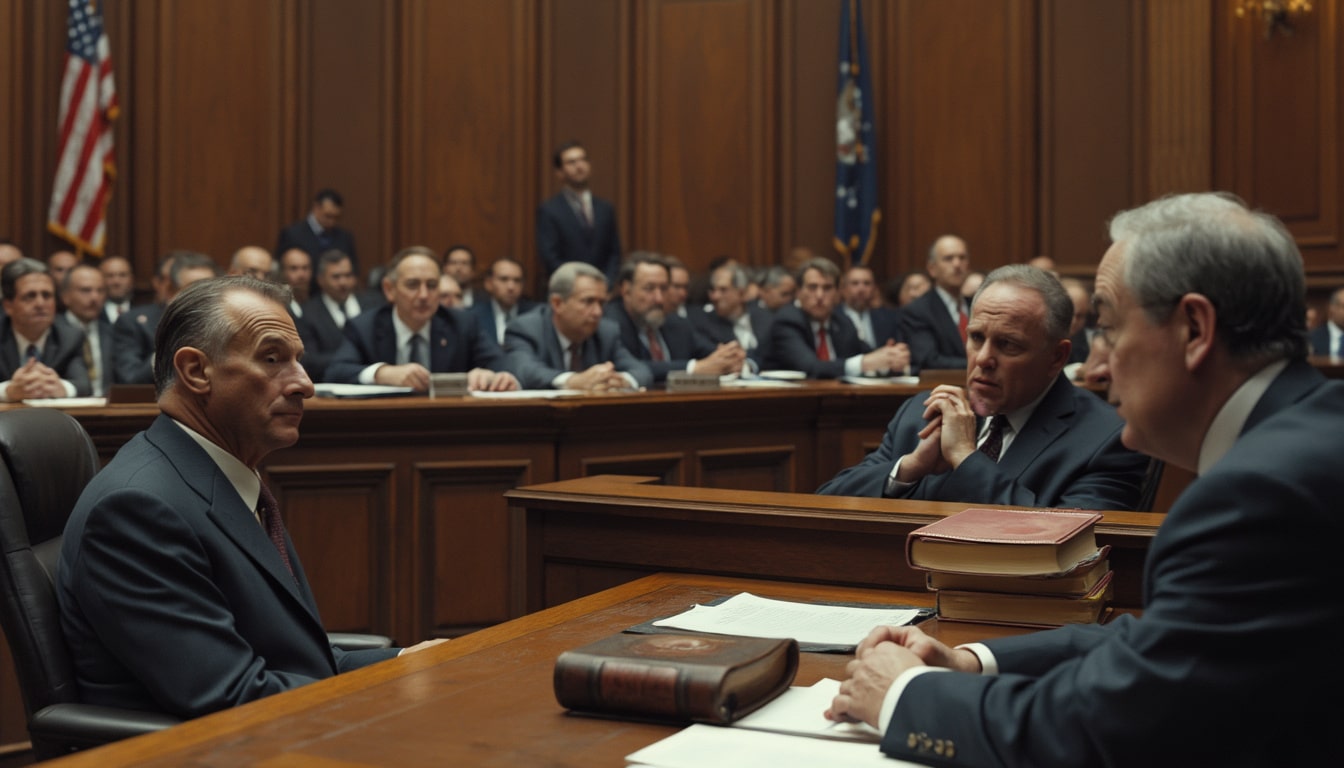The ongoing scrutiny surrounding the federal appointment of Troy Meink as the Air Force Secretary Nominee illustrates a significant intersection between government oversight and corporate interests. As Meink steps into the spotlight, Senate Democrats are raising eyebrows over his potentially questionable ties to Elon Musk and SpaceX’s lucrative satellite contract acquisition. Allegations of favoritism and misconduct paint a concerning picture of how defense contracts may be influenced by individual relationships and corporate agendas.
Recent communications from prominent Senate figures such as Elizabeth Warren and Tammy Duckworth shed light on apprehensions about Meink’s nomination. The senators assert that these claims highlight a troubling potential compromise in his ability to equitably oversee military satellite procurement, raising fundamental questions about federal contracts and their implications for national security.
Allegations of Misconduct and Favoritism
The concerns surrounding Troy Meink’s nomination primarily focus on allegations that he may have facilitated preferential treatment for SpaceX under his watch at the National Reconnaissance Office (NRO). These assertions stem from an investigation indicating that Meink altered the contract requirements for a $2.5 billion satellite project, effectively sidelining competitors like L3Harris Technologies. This situation has compelled Senators Warren and Duckworth to demand clarity about the influence of Musk’s connection on Meink’s nomination.

The Role of the National Reconnaissance Office
The National Reconnaissance Office plays a critical role in the management of military satellite procurement. Its influence over contracting procedures and supplier selection is vast, which emphasizes the necessity for rigorous government oversight. In this context, the allegations against Meink suggest an environment ripe for potential monopolization of contracts by specific companies, particularly SpaceX. The fear is that increasing reliance on a single vendor could not only hinder competition but also stifle innovation, ultimately affecting national defense.
Reports indicate that during his tenure, Meink appeared to have enacted changes that may have diminished competition, raising alarms among key lawmakers and stakeholders in the defense and aerospace industry. Such practices not only impact the bidding process but also set concerning precedents for future engagements between governmental agencies and private contractors.
Implications for Congressional Hearings
As the Senate deliberates on Meink’s nomination, the path forward includes a forthcoming congressional hearing where these allegations are expected to be critically examined. This process will provide a venue for raising critical questions about the adequacy of government oversight in defense contracts and the ethical implications surrounding conflicts of interest. Meink’s responses to inquiries regarding his relationship with Musk will be pivotal in determining his suitability for the Air Force Secretary position.
The senators’ concerns underscore a broader trend of accountability in the realm of defense contracting, where relationships between influential figures and corporate entities can significantly shape outcomes within the military-industrial complex. The outcome of this congressional hearing has the potential to influence not only Meink’s nomination but also future policies regarding the defense sector’s interaction with private companies like SpaceX.
Response from Meink and Industry Perspectives
As the inquiry proceeds, Meink has been called upon to provide detailed responses to the allegations levied against him. His ability to convey transparency and uphold public confidence in the Air Force’s operations will be scrutinized rigorously. The stakes are high, especially since a favorable ruling from the Senate could solidify the existing power dynamics within government-contracting relationships.

Industry Responses to the Allegations
The broader aerospace industry is watching closely, as the implications of Meink’s nomination and the subsequent investigations pose critical ramifications on future defense contracts. Prime contractors, especially those competing with SpaceX, have expressed concern regarding the integrity of processes that dictate contract awards. The acknowledgment from lawmakers about these issues signals a shift towards wanting more accountability in how contracts are awarded and monitored.
This environment stresses the need for clarity and regulation limiting conflicts of interest. The goal is to promote a fair bidding process that fosters innovation while safeguarding taxpayer interests. Lawmakers assert that without changes to current practices, the military may become overly reliant on singular entities, which threatens competition and could inflate costs.
Debate Over National Security and Competition
The debate surrounding the intersection of national security and competition within the aerospace sector has intensified as the realities of proposed contracts unfold. A significant concern is whether the defense apparatus should prioritize innovation and competitive bidding over contracts that may hinge on personal relationships. The possibility of evolving regulatory frameworks will take center stage as discussions advance.
Senators Warren and Duckworth’s inquiries aim to illustrate just how critical these facets of government operations are, especially as technological advancements propel the defense industry forward. The focus on SpaceX and its relationship with the Air Force is a realization of how intertwined corporate motives have become and how they can shape the future of military operations.
The Path Forward: Ensuring Accountability in Defense Contracts
Moving forward, the Senate must establish comprehensive measures to ensure accountability and transparency in defense contracts. Case studies from companies like SpaceX provide valuable lessons that can inform more robust regulatory frameworks. The concerns raised by lawmakers highlight an urgent need for coordinated responses to enhance oversight and build trust within defense contracting and procurement processes.

Strategies for Enhanced Oversight
One potential pathway to improving governance is developing stricter eligibility criteria for prospective nominees in defense-related roles. By ensuring that such individuals remain distanced from significant corporate relationships, gaps in oversight can be minimized. This kind of safeguarding not only protects national interests but also preserves competition within the aerospace industry.
Additionally, incorporating regular audits and assessments into the contracting process can provide greater scrutiny of decisions made concerning contract awards. Such audits can help mitigate risks and hold decision-makers accountable for any favoritism or misconduct. Ensuring that processes are transparent and well-documented can bolster public trust and reinforce the integrity of the military procurement system.
The Role of Legislative Action
Moreover, Congress plays a pivotal role in shaping policies that affect procurement practices. Legislative action aimed at curbing potential conflicts of interest and reinforcing oversight mechanisms can create a more equitable environment for all involved parties. Encouraging more diverse bidding processes among contractors will only enhance the innovative landscape of the aerospace industry.
As discussions surrounding Meink’s nomination continue to unfold, the implications of these actions will resonate throughout the federal government’s engagement with private aerospace firms. Reassessing how relationships impact awarding contracts will invite a broader dialogue on ensuring ethical practices that align with the core values of accountability and excellence in defense.
Conclusion: A Call for Change
The potential confirmation of Troy Meink as Air Force Secretary Nominee has opened a critical discussion regarding the relationship between government oversight and corporate influence in defense contracting. Allegations of misconduct and favoritism highlight the urgent need for reforms that enhance transparency and accountability in the procurement of military resources.
As Senate Democrats pursue answers to their pressing questions, the gravity of their concerns becomes increasingly evident. The intersection of personal connections and federal contracts necessitates careful examination, as it holds the key to shaping future engagements between government and industry players. Ultimately, striving for a balanced and fair procurement process will fortify national security while fostering innovative competition within the aerospace sector.
| Allegation | Details | Potential Impact |
|---|---|---|
| Misconduct | Altered contract requirements, favoring SpaceX | Monopoly over military satellite contracts |
| Favoritism | Connection with Elon Musk influencing decisions | Reduced competition in aerospace contracts |
| Lack of Oversight | Reduced scrutiny of contract awarding processes | Risk of inflated prices and stifled innovation |
- Senate Democrats raise concerns
- SpaceX lucrative satellite contract
- Musk federal contracts inquiry
- Defense Secretary confirmation hearing
- Senators ask questions regarding SpaceX
- Senate scrutiny of Meink’s suitability
- Inquiry into SpaceX contracts
- Air Force nominee questioned about SpaceX
- Billionaire deputy defense secretary nominee
- USAID takeover concerns




Leave a Reply